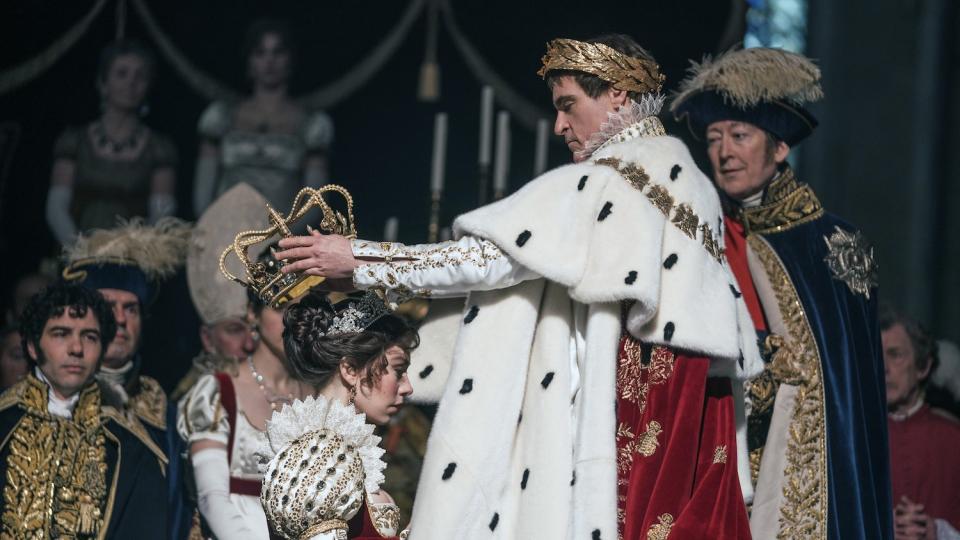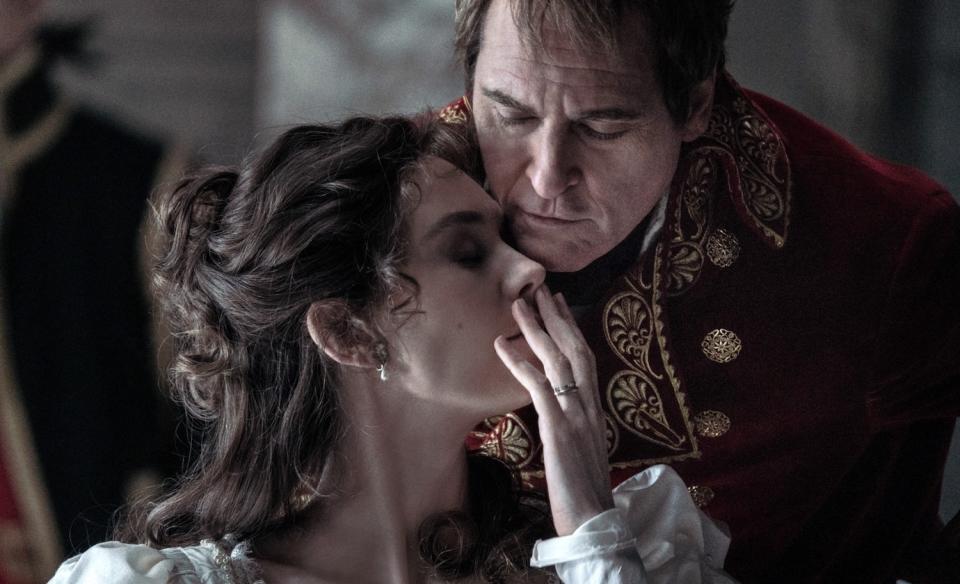Forget Napoleon, Josephine Is The Kickass Empress Who Steals This Movie

- Oops!Something went wrong.Please try again later.
In Ridley Scott’s Napoleon, Vanessa Kirby has transformed a maligned, historical figure—Josephine Bonaparte—into a kickass, independent, outspoken woman with a voice and an opinion. Like many wives, girlfriends, sisters, and daughters of famous men, Josephine was an afterthought in historical texts and often merely written off as “Napoleon’s wife” with no depth of research or information about her, well after her death.
Indeed, Kirby’s interviews around the movie have revealed that it was her job to create Josephine as much from her imagination as from historical texts. As Kirby told Vogue France, “I had never come across a character quite so enigmatic and so difficult to understand.”
More from StyleCaster
It might be easy to assume Vanessa Kirby’s Josephine Bonaparte—with delicate tendrils framing her fine-boned face—is an attractive sideshow in the Napoleon Bonaparte story. After all, the real Empress Josephine was relegated to some footnotes in history books, merely the romantic interest of the (supposedly) much more fascinating, battle-hungry Napoleon.
In fact, as difficult as she finds it to navigate a world run by men for the benefit of men, Josephine always has a sense of assurance about her. She believes that she is deserving of greatness and that her intellect and physical beauty are assets, rather than the liabilities that Napoleon believes them to be (especially when he leaves for battle, hearing rumors of Josephine’s sexual liaisons in his absence).
Napoleon director Ridley Scott should not be underestimated as far as his investment in women characters. For all the warmongering, bloodied battle movies he’s famed for (Gladiator, Black Hawk Down, Exodus: Gods and Kings, etc), he also directed one of the most famous female friendship dramas of all time in 1991’s Thelma & Louise. In 1979, he also directed Sigourney Weaver as the fiercely determined Ripley in Alien, which is still considered one of the most iconic and heroic characters in film.

In Napoleon, as epic (and frightful) as Joaquin Phoenix’s Napoleon Bonaparte is, it is the courageous, intelligent Josephine who steals the show. It is a triumph that Josephine’s story is blazing across cinema screens over two centuries since her death from pneumonia in May, 1814. An Empress, a Queen, a prisoner, a scorned wife, and a patron of the arts: Josephine was unique, significant, and fascinating. How was it that she was so lamentably erased from history in favor of hundreds of thousands of books on Napoleon in which her existence is shrunken to being only a great man’s love interest?
Viewers are introduced to Kirby’s Josephine as she is leaving the Carmes Prison in Paris, five days after the guillotine execution of her first husband Alexandre de Beauharnais, a general in the French Revolution. Alexandre was the father of her two children, Eugene and Hortense, and to this day, many of the European royal families can trace their ancestry back to Josephine.
Still, most historical texts refer to Josephine’s surname as “de Beauharnais”, but she took this name from her first husband and immediately stopped using it upon marrying Napoleon and adopting “Bonaparte”. It was easier for historians to imagine Josephine in the shadows of her husbands, either a de Beauharnais or a Bonaparte, but her full, beautiful name was Marie Joseph Rose Tascher de la Pagerie. That was the name she sometimes reverted to after her marriage to Napoleon was annulled.
From birth, Josephine’s life had been planned and strategized by her wealthy parents. It was her own fiery, independent spirit that enabled her to challenge the assumptions made of her and the rigid roles she was squeezed into. Kirby portrays her as sassy, with the sort of reckless confidence of a woman who has survived prison, the slaughter of her husband, affairs with powerful politicians, and marriage to one of France’s most feared and worshipped figures: the Emperor Napoleon.
It was a confidence that wasn’t easily earned. At only 15, Josephine was betrothed to 17-year-old Alexandre de Beauharnais because her younger sister Catherine-Desiree—his original choice—had died, and their grandmother refused to allow their youngest sister Marie-Francoise (not even 12 years old) to leave the family home to be married. Josephine was the final option, a commiseration prize as the elderly bride at only 15.
Unsurprisingly, Alexandre abandoned Josephine and their children to spend his time in brothels and ultimately moved in with his mistress until their eventual separation. It did not relieve Josephine of her burdensome marriage though, and she was imprisoned in 1794 because of Alexandre’s counter-revolutionary activity.

And so, we meet the fictional movie Josephine at this point—already a survivor, a child bride, a scorned wife, and a single mother. “She was a kind of outsider, just as Napoleon was,” Kirby revealed in a featurette for the film. “Josephine had to be this incredible force of nature…she was iconic, and I felt really honored to try to inhabit her.”
Whether the real Josephine was as strikingly elegant and statuesque as Kirby is by the by. The real Josephine was catnip to powerful men. Months after Napoleon met her in 1795, then six years her junior, he wrote a beseeching letter revealing his absolute intoxication with her. By January, he had proposed and they were married in March.
Letters between the two, in which he is exceedingly sentimental and overwrought with emotion and she is much more measured in response, have led historians to suggest that she was not nearly as in love with him as he was with her. The movie version suggests otherwise; that his overblown antics and self-obsession were so tiresome to contend with that Josephine refused to imitate his performative antics. She loved him though, almost as a mirror of her own desire to command and wield power over adoring masses.
You may love or loathe this movie, but Kirby’s impassioned, fiery Josephine is a catharsis over two centuries in the making. Finally, the real Josephine has been gifted an actress worthy of representing her as a complicated, sexually liberated, irrepressible woman.
Best of StyleCaster

